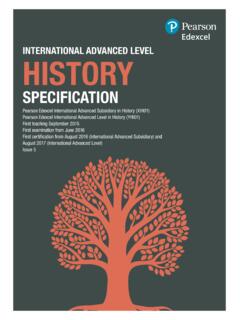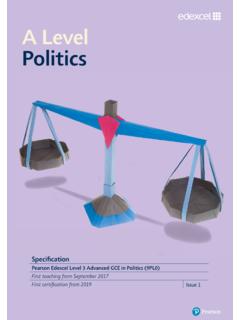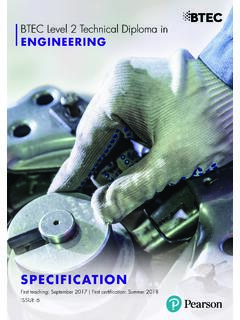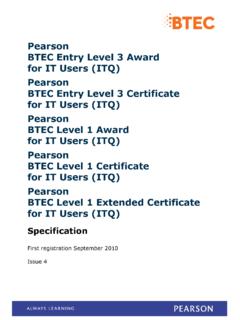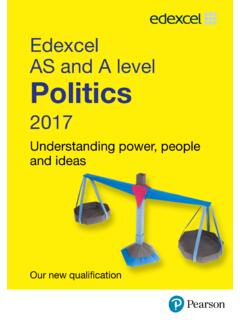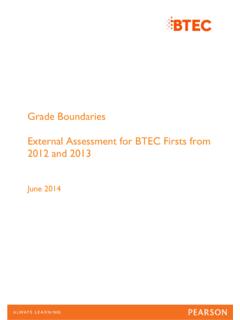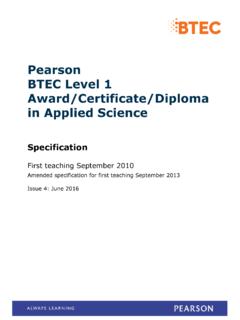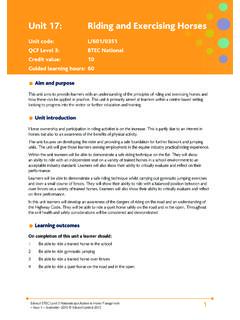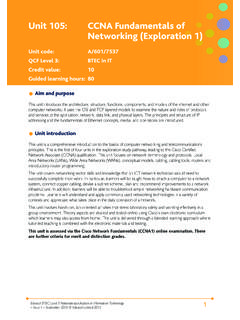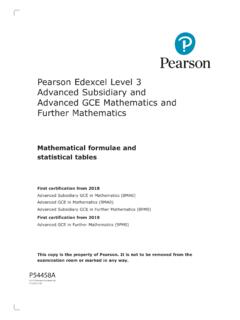Transcription of Edexcel GCSE and GCE 2014 - Pearson qualifications
1 A Level Economics A. Specification Pearson Edexcel Level 3 advanced GCE in Economics A (9EC0). First teaching from September 2015. First certification from 2017 Issue 2. Pearson Edexcel Level 3. advanced GCE. in Economics A (9EC0). Specification First certification 2017. Issue 2. Edexcel , BTEC and LCCI qualifications Edexcel , BTEC and LCCI qualifications are awarded by Pearson , the UK's largest awarding body offering academic and vocational qualifications that are globally recognised and benchmarked. For further information, please visit our qualification websites at , or Alternatively, you can get in touch with us using the details on our contact us page at About Pearson Pearson is the world's leading learning company, with 40,000 employees in more than 70 countries working to help people of all ages to make measurable progress in their lives through learning.
2 We put the learner at the centre of everything we do, because wherever learning flourishes, so do people. Find out more about how we can help you and your learners at: This specification is Issue 2. Key changes are sidelined. We will inform centres of any changes to this issue. The latest issue can be found on the Pearson website: References to third party material made in this specification are made in good faith. Pearson does not endorse, approve or accept responsibility for the content of materials, which may be subject to change, or any opinions expressed therein. (Material may include textbooks, journals, magazines and other publications and websites.). All information in this specification is correct at time of publication. Original origami artwork: Mark Bolitho Origami photography: Pearson Education Ltd/Naki Kouyioumtzis ISBN 978 1 446 93895 9.
3 All the material in this publication is copyright Pearson Education Limited 2016. Summary of Pearson Edexcel Level 3. advanced GCE in Economics A. Specification Issue 2 changes Summary of changes made between previous issue and this Page number current issue Change to section c) subject content 12. Changes to wording of sections c) and f) subject content 16. Change to wording of section c) subject content 31. Earlier issues show previous changes. If you need further information on these changes or what they mean, contact us via our website at: From Pearson 's Expert Panel for World Class qualifications The reform of the qualifications system in England is a profoundly important change to the education system. Teachers need to know that the new qualifications will assist them in helping their learners make progress in their lives.
4 When these changes were first proposed we were approached by Pearson to join an Expert Panel' that would advise them on the development of the new qualifications . We were chosen, either because of our expertise in the UK education system, or because of our experience in reforming qualifications in other systems around the world as diverse as Singapore, Hong Kong, Australia and a number of countries across Europe. We have guided Pearson through what we judge to be a rigorous qualification development process that has included: Extensive international comparability of subject content against the highest- performing jurisdictions in the world Benchmarking assessments against UK and overseas providers to ensure that they are at the right level of demand Establishing External Subject Advisory Groups, drawing on independent subject- specific expertise to challenge and validate our qualifications Subjecting the final qualifications to scrutiny against the DfE content and Ofqual accreditation criteria in advance of submission.
5 Importantly, we have worked to ensure that the content and learning is future oriented. The design has been guided by what is called an Efficacy Framework', meaning learner outcomes have been at the heart of this development throughout. We understand that ultimately it is excellent teaching that is the key factor to a learner's success in education. As a result of our work as a panel we are confident that we have supported the development of qualifications that are outstanding for their coherence, thoroughness and attention to detail and can be regarded as representing world-class best practice.. Sir Michael Barber (Chair) Professor Lee Sing Kong Chief Education Advisor, Pearson plc Director, National Institute of Education, Singapore Bahram Bekhradnia Professor Jonathan Osborne President, Higher Education Policy Institute Stanford University Dame Sally Coates Professor Dr Ursula Renold Principal, Burlington Danes Academy Federal Institute of Technology, Switzerland Professor Robin Coningham Professor Bob Schwartz Pro-Vice Chancellor, University of Durham Harvard Graduate School of Education Dr Peter Hill Former Chief Executive ACARA.
6 Introduction The Pearson Edexcel Level 3 advanced GCE in Economics A is designed for use in schools and colleges. It is part of a suite of GCE qualifications offered by Pearson . Purpose of the specification This specification sets out: the objectives of the qualification any other qualification(s) that a student must have completed before taking the qualification any prior knowledge and skills that the student is required to have before taking the qualification any other requirements that a student must have satisfied before they will be assessed or before the qualification will be awarded the knowledge and understanding that will be assessed as part of the qualification the method of assessment and any associated requirements relating to it the criteria against which a student's level of attainment will be measured (such as assessment criteria).
7 Rationale The Pearson Edexcel Level 3 advanced GCE in Economics A meets the following purposes, which fulfil those defined by the Office of qualifications and Examinations Regulation (Ofqual) for GCE qualifications in their GCE Qualification Level Conditions and Requirements document, published in April 2014. The purposes of this qualification are to: define and assess achievement of the knowledge, skills and understanding that will be needed by students planning to progress to undergraduate study at a UK. higher education establishment, particularly (although not only) in the same subject area, for example economics degrees with a focus on theory, or degrees in applied economics such as environmental economics, labour economics, public sector economics or monetary economics set out a robust and internationally comparable post-16 academic course of study to develop that knowledge, skills and understanding enable UK universities to accurately identify the level of attainment of students provide a basis for school and college accountability measures at age 18.
8 Provide a benchmark of academic ability for employers. Qualification aims and objectives The aims and objectives of the Pearson Edexcel Level 3 advanced GCE in Economics A are to enable students to: develop an interest in, and enthusiasm for, the subject appreciate the contribution of economics to the understanding of the wider economic and social environment develop an understanding of a range of concepts and an ability to use those concepts in a variety of different contexts use an enquiring, critical and thoughtful approach to the study of economics and develop an ability to think as an economist understand that economic behaviour can be studied from a range of perspectives develop analytical and quantitative skills, together with qualities and attitudes that will equip them for the challenges, opportunities and responsibilities of adult and working life.
9 The context for the development of this qualification All our qualifications are designed to meet our World Class Qualification Principles[1]. and our ambition to put the student at the heart of everything we do. We have developed and designed this qualification by: reviewing other curricula and qualifications to ensure that it is comparable with those taken in high-performing jurisdictions overseas consulting with key stakeholders on content and assessment, including learned bodies, subject associations, higher-education academics, teachers and employers to ensure this qualification is suitable for a UK context reviewing the legacy qualification and building on its positive attributes. This qualification has also been developed to meet criteria stipulated by Ofqual in their documents GCE Qualification Level Conditions and Requirements and GCE.
10 Subject Level Conditions and Requirements for Economics, published in April 2014. [1]. Pearson 's World Class Qualification Principles ensure that our qualifications are: demanding, through internationally benchmarked standards, encouraging deep learning and measuring higher-order skills rigorous, through setting and maintaining standards over time, developing reliable and valid assessment tasks and processes, and generating confidence in end users of the knowledge, skills and competencies of certified students inclusive, through conceptualising learning as continuous, recognising that students develop at different rates and have different learning needs, and focusing on progression empowering, through promoting the development of transferable skills, see Appendix 1. Contents Qualification at a glance 1.
